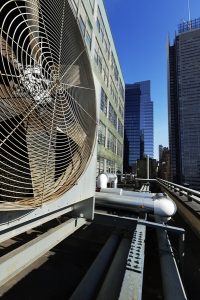
As a business owner, keeping your overhead costs manageable is always a priority. One expense that can quickly spiral out of control is energy costs, especially when it comes to HVAC systems. If you’ve noticed a sudden spike in your commercial energy bills, your HVAC system may be the culprit. For facilities running year-round cooling, the causes might be similar to those found in residential AC energy spikes, such as overworked units or system inefficiencies.
Let’s explore several common reasons behind rising HVAC energy costs and how our team can help you get them back under control with services like our commercial HVAC repair in Warner Robins, GA.
1. Inefficient or Aging HVAC Systems
One of the leading causes of increasing energy costs is an inefficient or outdated HVAC system. Older systems are typically less energy-efficient than newer models, and as the equipment ages, its performance tends to degrade. This means your HVAC unit may have to work harder to maintain the desired indoor temperature, consuming more energy in the process.
Solution: Replace an aging system with a newer, more energy-efficient model to significantly reduce energy consumption. We can evaluate your current system and recommend upgrades or replacements that meet your energy-saving goals.
2. Poor Maintenance Practices
Regular maintenance is essential to keep your HVAC system running at peak efficiency. Without routine servicing, components can become dirty, worn, or misaligned, causing the system to overwork. Filters may become clogged, reducing airflow, or belts may loosen, leading to decreased efficiency. These seemingly small issues can result in substantial energy waste over time.
Solution: Schedule regular HVAC maintenance. We offer customized maintenance plans to match your business.
3. Inconsistent or Incorrect Thermostat Settings
Commercial buildings often have different temperature zones that require careful management. If the thermostat settings are inconsistent or inaccurate, your HVAC system could be working overtime unnecessarily to heat or cool spaces. For example, if areas of your building are being cooled when they’re not in use, or if the thermostat isn’t calibrated correctly, you may experience higher energy consumption.
Solution: Install programmable or smart thermostats. If your building still uses older manual models, upgrading to a smart thermostat can help automate scheduling and improve zone control, ultimately cutting down on unnecessary energy usage.
4. Leaking Ductwork
Another common issue in commercial HVAC systems is leaking ductwork. Over time, ducts can develop small cracks or gaps that allow conditioned air to escape before it reaches its intended destination. This forces the HVAC system to work harder to compensate for the lost air, leading to higher energy usage and costs.
Solution: If your building has older ductwork, it’s crucial to have it inspected for leaks. We perform duct testing to identify and seal leaks.
5. Incorrect HVAC System Sizing
When an HVAC system is too large or too small for a commercial building, it can lead to energy inefficiencies. An oversized unit will cycle on and off frequently, while an undersized system will struggle to maintain comfortable temperatures, both of which result in wasted energy.
Solution: We can assess your building’s HVAC needs and ensure that your system is correctly sized. Improper sizing can also lead to short-cycling and long-term system strain, both of which drive up operational costs while lowering system lifespan.
If your business is struggling with rising HVAC energy costs, don’t wait contact us today. Let us help you regain control over your energy usage and keep your facility comfortable year-round while minimizing operational costs.

